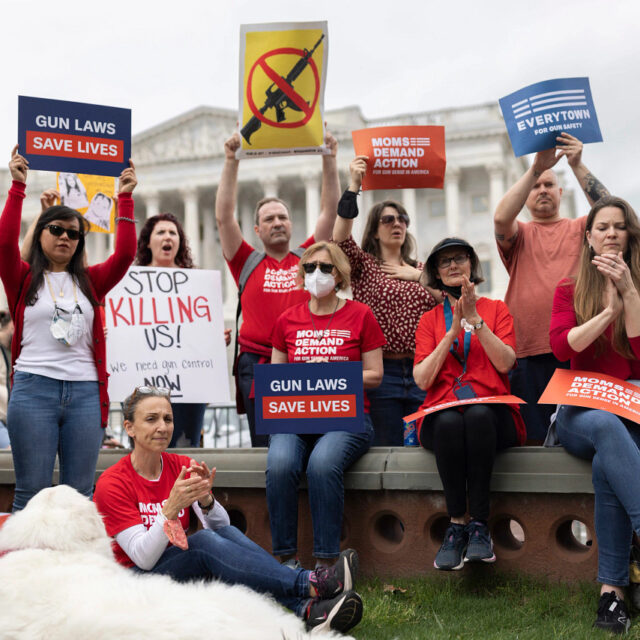VAWA & NICS Denial Notification
Learn More:
The National Instant Criminal Background Check System (NICS) stops tens of thousands of convicted felons, domestic abusers, and other prohibited people from buying guns each year – blocking over 4 million illegal firearm sales since 1994. However, potential purchasers often get caught by the NICS background check system after lying on the background check form, and then walk away with no consequences, free to try to arm themselves in other ways. A study commissioned by the U.S. Department of Justice found that 30 percent of people who failed criminal background checks while attempting to purchase firearms over the course of a year were rearrested within five years.1James Tien et al., Structured Decisions Corporation, Recidivism of Denied Prospective Firearm Purchases, May 2008, at http://1.usa.gov/1Dm1lSG. Everytown for Gun Safety and Moms Demand Action have been at the forefront of bipartisan efforts to strengthen the law around “lie and try” to ensure information on background check denials is provided to relevant state, local or tribal law enforcement.
The bipartisan Violence Against Women Act (VAWA) reauthorization is included in the Fiscal Year 2022 omnibus appropriations bill, and would require the Attorney General to alert relevant state, local or tribal law enforcement with information about a person denied a firearm purchase under federal law (18 U.S.C. § 922(g) and (n)) within 24 hours. This closes the gap for the 37 states2The 37 states are Alabama, Alaska, Arizona, Arkansas, Delaware, Georgia, Idaho, Indiana, Iowa, Kansas, Kentucky, Louisiana, Maine, Maryland, Massachusetts, Michigan, Minnesota, Mississippi, Missouri, Montana, Nebraska, New Hampshire, New Mexico, New York, North Carolina, North Dakota, Ohio, Oklahoma, Rhode Island, South Carolina, South Dakota, Texas, Vermont, Washington, West Virginia, Wisconsin, and Wyoming. and the District of Columbia that rely on the FBI to run some or all of their background checks and where state, local and tribal law enforcement are not required to be made aware when a person in their state fails a background check. This proposal will also provide critical information to all states when their residents illegally try to purchase a firearm in another state. This notice gives state, local and tribal law enforcement an opportunity to intervene before the abuser (or other prohibited purchaser) can illegally obtain a firearm in another way or do further harm. Domestic abusers far too frequently attempt to illegally purchase firearms – from November 1998 through January 2022, NICS reported it denied nearly 178,000 gun sales to domestic abusers convicted of misdemeanor crimes and more than 71,000 sales to abusers subject to a domestic violence restraining order.3FBI release on Federal Denials at https://www.fbi.gov/file-repository/federal_denials.pdf/view.
This provision in the VAWA reauthorization bill closely aligns with the bicameral, bipartisan legislation introduced last year (S. 675 & H.R. 1769), and carries forward the bipartisan work on NICS denial notifications that has occurred at the federal and state levels for years. For example, in November 2019, Attorney General William Barr launched Project Guardian, which directed the ATF to provide notifications to state law enforcement fusion centers about background check denials.
Bipartisan bills have been introduced over the past several Congresses to codify this practice, with the NICS Denials Notification Act of 2021 being introduced by Senator John Cornyn (R-TX) and Senator Chris Coons (D-DE), and sponsored by an additional eight Democrats and seven Republicans.4The bill has been cosponsored by Senators Tammy Duckworth (D-IL), Marco Rubio (R-FL), Tom Carper (D-DE), James Lankford (R-OK), Amy Klobuchar (D-MN), Susan Collins (R-ME), Joe Manchin (D-WV), Pat Toomey (R-PA), Lindsay Graham (R-SC), Jeanne Shaheen (D-NH), Chuck Grassley (R-IA), Patrick Leahy (D-VT), Richard Blumenthal (D-CT), Lisa Murkowski (R-AK), and Richard Durbin (D-IL). This legislation is endorsed by the Fraternal Order of Police, the Major Cities Chiefs Association, the Federal Law Enforcement Officers Association, the National District Attorneys Association, the National Domestic Violence Hotline, the National Coalition Against Domestic Violence, and Everytown. In addition, the bipartisan appropriations packages for both Fiscal Years 2020 and 2021 included specific Congressional direction for the Attorney General to make NICS denial notifications to state law enforcement, and to local law enforcement as practicable.
In the 13 states that run all of their own background checks (known as full “point-of-contact” states), state authorities are already aware when prohibited persons fail a background check, and relevant state or local law enforcement can then investigate these cases. 9 of those 13 states have adopted explicit policies that require the state officials to alert local officials to background check denials.5The 9 states are California, Colorado, Hawaii, Illinois, Oregon, Pennsylvania, Tennessee, Utah, and Virginia. Washington and Louisiana have also enacted policies to share background check denial information with local law enforcement. States that have these reporting requirements have seen success. For example, Pennsylvania’s program has resulted in nearly 5,000 reported convictions of people attempting to illegally purchase guns.6Evanchick, R. “Pennsylvania State Police 2019 Firearms Annual Report”. Pennsylvania State Police. (2019) at https://bit.ly/30V3Dww. These policies pass with bipartisan support in red, blue and purple states. In 2016, Everytown and Moms Demand Action strongly supported a bill that required the Tennessee Bureau of Investigation to alert local officials when domestic abusers illegally attempt to purchase a firearm from a licensed dealer and fail a background check, which passed unanimously in the House, received overwhelming bipartisan support in the Senate, and ended with Everytown and Moms Demand Action joining a signing ceremony with Tennessee’s Republican Governor Bill Haslam.
Everytown strongly supports passing the NICS denial notification provision as part of the VAWA reauthorization bill to complete bipartisan efforts and permanently close this loophole.


